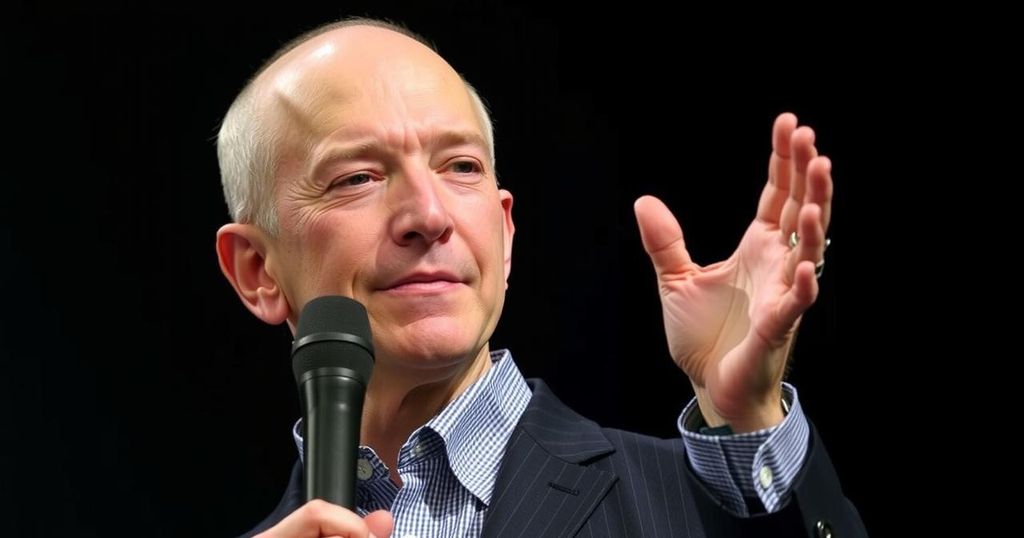Jeff Bezos has defended The Washington Post’s decision to refrain from endorsing candidates for the upcoming U.S. presidential election, citing the need to enhance media credibility and avoid perceptions of bias. This decision led to a wave of subscriber cancellations and sparked criticism among some journalists, with notable dissent manifesting in opinion pieces and resignations. Bezos clarified that the decision was not influenced by political pressures from any candidates and reaffirmed the organization’s commitment to maintaining journalistic integrity.
Jeff Bezos, the owner of The Washington Post, has publicly defended the publication’s recent decision to refrain from endorsing a candidate in the upcoming U.S. presidential election. This move comes in light of reported subscriber cancellations, with approximately 200,000 individuals opting to discontinue their digital subscriptions. National Public Radio (NPR) highlighted that the decision prevented the intended endorsement of Democratic candidate Kamala Harris, leading some dissatisfied subscribers to attribute the blame to Mr. Bezos, the founder of Amazon and aerospace manufacturer Blue Origin. In an opinion piece published in The Washington Post, Bezos asserted, “most people believe the media is biased” and emphasized that The Washington Post and other news outlets must enhance their credibility. He articulated that presidential endorsements do not genuinely influence election outcomes but rather foster a perception of bias and a lack of independence. Consequently, he deemed the discontinuation of endorsements a principled choice that aligns with the newspaper’s integrity. Bezos faced scrutiny regarding the controversial timing of the announcement, occurring just weeks before Election Day. Critics speculated that he might have been motivated by concerns of retaliation from Republican candidate Donald Trump, should he gain the presidency. However, Bezos clarified that no candidates were informed of the decision prior, asserting that there was “no quid pro quo” associated with the editorial shift. Furthermore, he denied any linkage between the endorsement decision and a meeting between Trump and top officials from Blue Origin on the same day. The publisher and CEO of The Washington Post, William Lewis, corroborated that the publication would abstain from endorsing any presidential candidate in November and in future elections, stating, “We are returning to our roots of not endorsing presidential candidates.” The Washington Post, renowned for its investigative journalism, including its pivotal reporting on the Pentagon Papers and the Watergate scandal, has received 76 Pulitzer Prizes, underscoring its status as a leading newspaper in the United States. Despite its storied legacy, the decision not to endorse a candidate has incited concern amongst the paper’s journalists. Several columnists have expressed their disagreement in opinion pieces on the Post’s website, with some resigning in protest, calling it “a terrible mistake” that contradicts the fundamental editorial convictions of the publication they respect.
The topic revolves around the significant decision by The Washington Post, under the ownership of Jeff Bezos, to forgo endorsements in presidential elections. This decision reverts to a historical stance of neutrality and has generated considerable backlash, particularly among the newspaper’s staff and readership. The background of the Washington Post’s impacts includes its celebrated journalistic accomplishments and the inherent challenges faced by media outlets in maintaining credibility in a politically charged atmosphere. This context is crucial to understand the ramifications of the editorial choice and the broader discussion about media impartiality, credibility, and the expectations of their audiences.
In conclusion, Jeff Bezos’s defense of The Washington Post’s decision to halt presidential endorsements underscores the delicate balance that media organizations must strike between impartiality and public perception. This move aims to enhance the newspaper’s credibility, yet it has elicited varied reactions, highlighting the complexity of maintaining journalistic integrity in today’s political climate. With a legacy of impactful reporting, the decision’s implications will likely be a focal point of discussion among journalists and readers alike as the 2024 election approaches.
Original Source: www.aljazeera.com






